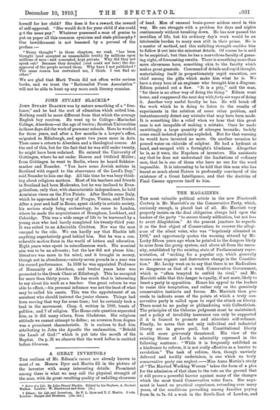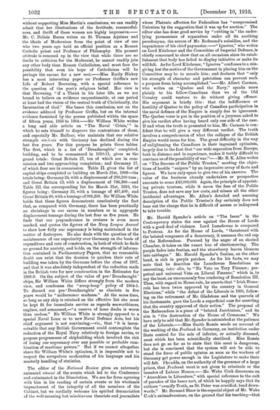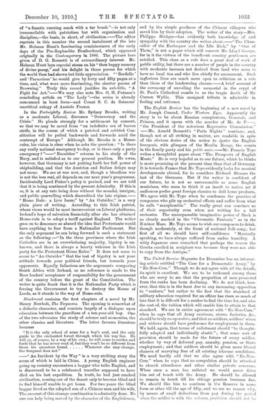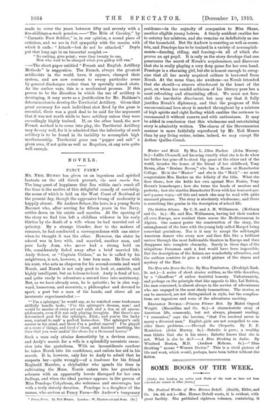THE MAGAZINES.
THE most valuable political article in the new Nineteenth Century is Mr. Marriott's on the Conservative Party, which, curiously enough, is placed last of all. Mr. Marriott very properly insists on the dual obligation always laid upon the leaders of the party "to secure timely edification, but not less to avert dilapidation." At the present juncture he regards it as the first object of Conservatism to recover the allegi- ance of the silent voter, who was "hopelessly alienated in 1906," and opportunely quotes the warning uttered by Mr. Lecky fifteen year ago when he pointed to the dangers likely to arise from the group system, and above all from the neces- sity, established by the existing state of Parliamentary repre- sentation, of " seeking for a popular cry, which generally means some organic and destructive change in the Constitu- tion." Mr. Lecky went on to say that there is no Radicalism so dangerous as that of a weak Conservative Government, which is "often tempted to outbid its rival," and Mr. Marriott adds that this danger is equally, if not more, likely to beset a party in opposition. Hence his appeal to the leaders to resist this temptation, and rather rely on the genuinely conservative instincts and forces. Mr. Marriott then pro- ceeds to indicate some of the points at which a truly con- servative party is called upon to repel the attack on liberty. There must be no parley or philandering with Collectivism. The principles of the Osborne judgment must be maintained, and a policy of invalidity insurance can only be supported if it is framed to promote and stimulate self-reliance. Finally, he notes that not only individual and industrial liberty are in grave peril, but Constitutional liberty is still more grievously threatened. His view of the existing House of Lords is admirably expressed in the following sentence : " While it is frequently exhibited as a hindrance to reform, it is not really effective as a barrier to revolution." The task of reform, then, though unwisely deferred and tardily undertaken, is one which no truly conservative party can neglect.--Miss Anna Martin's study of "The Married Working Woman" takes the form of a plea for the admission of that class to the vote on the ground that it will prove a powerful barrier against many of the changes which the most timid Conservative voter fears. Her argu- ment is based on practical experience, extending over many years, of the conditions prevailing among families paying from 3s. to 7s. 6d. a week in the South-East of London, and without supporting Miss Martin's conclusions, we can readily admit that her illustrations of the fortitude, resourceful- ness, and thrift of these women are highly impressive.— Mr. C. Delisle Burns writes on St. Thomas A4uinas and the ideals of Modernism from the point of view of one who two years ago held an official position as a Roman Catholic priest and Professor of Philosophy. His present attitude is summed up in the view that while there are no limits to criticism for the Modernist, he cannot readily join any other body than Roman Catholicism, and must face the possibility that even his hope of Catholicism will be perhaps the excuse for a new sect —Miss Emily Hickey has a most interesting paper on Professor Griffin's new Life of Robert Browning, with a special reference to the question of the poet's religious belief. Her view is that Browning, " if a Theist in his later life, as we are bound to believe on evidence unquestionable, at one period at least had the vision of the central truth of Christianity, the Incarnation of God." She bases this conclusion, not on the evidence adduced by Professor Griffin, but on the internal evidence furnished by the poems published within the space of fifteen years, 1850 to 1864.—Sir William White writes a long and able article on " The Naval Crisis," in which he sets himself to disprove the contentions of those, and especially Mr. Balfour, who maintain that our relative strength vis-a-vis with Germany has declined during the last five years. For this purpose he prints three tables. The first, which is a list of 'Dreadnoughts ' completed, building, and to be commenced in 1910-11, gives as the grand totals : Great Britain 27, ten of which are in com- mission and two approaching completion ; and Germany 17, of which four are in commission. Table IL gives the list of capital ships completed or building on March 31st, 1906—the totals being: Germany 24, with a displacement of 280,200 tons ; and Great Britain 53, with a displacement of 786,300—and Table III. the corresponding list for March 31st, 1910, the figures being : Germany 33, with a tonnage of 487,400; and Great Britain 60, with a tonnage of 995,200. Sir William White holds that these figures demonstrate conclusively the fact that, as compared with Germany, there has been practically no shrinkage in our excess in numbers or in aggregate displacement tonnage during the last four or five years. He finds that our preponderance in cruisers is even more marked, and quotes the figures of the Navy League Annual to show how fully our supremacy is being maintained in the matter of destroyers. He also deals with the question of the maintenance of our superiority over Germany on the basis of expenditure and rate of construction, in both of which he finds no ground for anxiety, and holds, on the strength of informa- tion contained in Parliamentary Papers, that no reasonable doubt can exist that the decision to quicken their rate of building was taken by the Germans before the close of 1907, and that it was absolutely independent of the reduction made in the British vote for new construction in the Estimates for 1908-9. On the subject of the value of pre-' Dreadnought' ships, Sir William White differs strongly from the modern view, and condemns the " scrap-heap" policy of 1904-5. To discard our pre-' Dreadnoughts' as obsolete in five years would be "midsummer madness." At the same time, so long as any ship is retained on the effective list she must be kept fit for immediate service as regards seaworthiness, engines, and armament,—" a reserve of lame ducks is worse than useless." Sir William White is strongly opposed to a special Naval Loan or to new Naval Defence Acts, but his chief argument is not convincing,—viz., that " it is incon- ceivable that any British Government could contemplate the reduction of the Royal Navy relatively to foreign navies, or propose programmes of shipbuilding which involved the risk of losing our supremacy over any possible or probable com- bination of maritime powers." But if we cannot altogether share Sir William White's optimism, it is impossible not to respect the scrupulous moderation of his language and his masterly handling of statistics.
The editor of the National Review gives an extremely animated resume of the events which led to the Conference and culminated in the Dissolution. We are far from agreeing with him in his reading of certain events or his wholesale impeachment of the integrity of all the members of the Cabinet, but we cordially welcome his spirited denunciation of the well-meaning but mischievous theorists and journalists
whose Platonic affection for Federalism has "compromised Unionism by the suggestion that it was up for auction." The editor also has done good service by "rubbing in" the under- lying permanence of separatism under all its soothing pseudonyms, the source of Mr. Redmond's subsidies, and the impenitence of his chief paymaster.—" Ignotus," who writes on Lord Kitchener and the Committee of Imperial Defence, is chiefly concerned to show that on all occasions since its estab- lishment that body has failed to display initiative or make its will felt. As for Lord Kitchener, "Ignotus " confesses to a mis- giving lest the motive of the Government in placing him on the Committee may be to muzzle him ; and declares that " only his strength of character and patriotism can prevent such a purpose from being accomplished."—Mr. Albert Carman, who writes on " Quebec and the Navy," speaks more plainly to his fellow-Canadians than we of the Old Country could venture to do without giving offence. His argument is briefly this : that the indifference or hostility of Quebec to the policy of Canadian participation in the naval defence of the Empire is simply due to ignorance. The Quebec voter is put in the position of a juryman asked to give his verdict after having heard only one side of the case. If and when the truth is presented to him, Mr. Carman is con- fident that he will give a very different verdict. The truth involves a comprehension of what the collapse of the British Empire would mean for him. The great difficulty in the way of enlightening the Canadians is their ingrained optimism, largely due to the fact that " our wide separation from Europe, both in distance and in experience, makes it trebly difficult to convince us of the possibility of war."—Mr. E. K. Allen writes on "The Success of the Public Trustee," meeting the objec- tions of hostile " snipers" by an impressive array of facts and figures. We have only space to give two of his answers. The value of the business already undertaken or prospective amounts to some £43,000,000. Again, the principle of Appoint- ing private trustees, while it saves the fees of the Public Trustee, does not save any law costs, and misses all the other incidental advantages. Mr. Allen's detailed and amusing description of the Public Trustee's day certainly does not bear out the charge that he is difficult of access or indisposed to take trouble.
Mr. Harold Spender's article on " The Issue" in the Contemporary states the case against the House of Lords with a good deal of violence. Lord Lansdowne is compared to Proteus. As for the House of Lords, " threatened with the belated vengeance of a democracy, it assumes the red cap of the Referendum. Pursued by the anger of an elected Chamber, it takes on the russet hue of electioneering. The purple fades into fustian, and the strawberry leaves blossom into cabbages." Mr. Harold Spender's fustian, on the other hand, is rich in purple patches. As for his facts, we may note that be describes the Lansdowne Resolutions as amounting, inter alia, to "No Veto on Tory Finance; per- petual and universal Veto on Liberal Finance," which is, to say the least, an uncommonly free rendering of Resolution III. Then, with regard to Home-rule, he asserts that " Irish Home- rule has been twice approved by the country in General Elections," while " the defeat of the Liberals in 1895, follow- ing on the retirement of Mr. Gladstone and the quarrels of his lieutenants, gave the Lords a superficial case for asserting that the country approved of their action." The proposal of the Referendum is a piece of "belated Jacobinism," and its aim is "the destruction of the House of Commons." We have only to add that Mr. Spender is astonished at the patience of the Liberals.—Miss Smith Rossie sends an account of the working of the Frei bank in Germany, an institution under State control for the sale of inferior, or actually diseased, meat which has been scientifically sterilised. Miss Rossie does not go so far as to state that this meat is dangerous, but she is convinced that the system will not be able to stand the force of public opinion as soon as the workers of Germany get power enough in the Legislature to make their will felt. She adds, on the authority of the governor of a large prison, that Freibank meat is not given to criminals or the inmates of Labour Homes.—Mr. Wake Cook discourses on " Anarchism in Literature," with special reference to the cult of paradox of the baser sort, of which he happily says that its authors "crucify Truth, as St. Peter was crucified, head down- wards." Mr. Bernard Shaw is the especial object of Mr. Wake Cook's animadversions, on the ground that his teaching—that of "a fanatic running amok with a tar brush "—is not only irreconcilable with patriotism but with organisation and discipline,—the basis, in short, of civilisation.—The editor
reprints in this number the second instalment of the late Mr. Holman Hunt's fascinating reminiscences of the early days of the Pre-Raphaelite Brotherhood, which appeared
originally in the Contemporary in 1886. The picture here given of D. G. Rossetti is of extraordinary interest. Mr.
Holman Hunt lays especial stress on his " then happy memory of divine poesy," and his delight in those poems for which the world then had shown but little appreciation. " Bordello '
and Paracelsus ' he would give by forty and fifty pages at a time, and, what were more fascinating, the shorter poems of Browning." Truly this record justifies its sub-title, "A Fight for Art."—We may also note Mrs. G. H. Putnam's
concluding article on " The Lady "—the series is already announced in book form—and Count S. C. de Soissons' uncritical eulogy of Anatole France.
In the Fortnightly Review Mr. Sydney Brooks, writing as a moderate Liberal, discusses "Democracy and the Crisis." He pleads strongly for a settlement by consent, so that we may be saved from " an indefinite era of barren
strife, in the course of which a patched and cobbled Con- stitution will be pulled backwards and forwards amid the contempt of Europe." Although Mr. Brooks is a Home- ruler, his vision is clear when he asks the question : " Is there any really national emergency to-day, or is there only a party emergency ? "—" Excubitor" returns to his study of the Navy, and is satisfied as to our present position. He owns, however, that Germany is not putting forth her full power of shipbuilding, and that the Austrian and Italian delays may not recur. We are at war now, and, though a bloodless war is not the less real, all depends on our next year's programme.
Incidentally Lord Fisher's policy is praised, and we are told that it is being continued by the present Admiralty. If this is so, it is at any rate being done without the scandal, intrigue,
and public quarrelling which discredited the late regime.— " Home Rule : a Live Issue," by "An Outsider," is a very plain piece of writing. According to this Irish patriot, whose views would be most inconvenient on Liberal platforms, Ireland's hope of salvation financially after she has obtained Home-rule is to adopt a tariff against England. The writer goes on to denounce as absurd the idea that Protestants would have anything to fear from a Nationalist Parliament. But the only argument he can bring forward is such a statement as the following :—" In the three provinces where the Irish Catholics are in an overwhelming majority, bigotry is un- known, and there is always a hearty welcome in the Irish party for the Protestant Home Ruler." It does not seem to occur to "An Outsider" that the test of bigotry is not your attitude towards your political friends, but towards your opponents. Equally fallacious are the arguments comparing South Africa with Ireland, as no reference is made to the Boer leaders' acceptance of responsibility for the government of the country before the grant of the Constitution. The writer is quite frank that it is the Nationalist Party which is forcing the Government to try to destroy the House of Lords, as it stands in the way of Home-rule.
Blackwood contains the first chapters of a novel by Mr. Henry Newbolt, The Twymans. The opening is somewhat of
a didactic character, and consists largely of a dialogue upon education between the guardians of a ten-year-old boy. One of the two advocates the study of science and economics, the other classics and literature. The latter favours literature because
"It is the only school of arms for a boy's soul, and the only guide to the enchanted forest through which his way lies. He will go, of course, by a way of his own; he will come to castles and fords that he has never read of, but they won't be so different from
those his ancestors found Whatever else may change, the Sangraal does not."
—" An Incident by the Way " is a very striking story the scene of which is laid in China. A young English engineer going up country encounters a beggar who talks English, and is discovered to be a celebrated traveller supposed to have
died on his last expedition. In truth, he had just reached civilisation, coming out of the desert only to become blind and to find himself unable to get home. For two years the blind beggar lived as the adopted son of a Chinese man and his wife, The account of this strange combination is admirably done. No one can help being moved by the character of the Englishman, and by the simple goodness of the Chinese villagers who saved him by their adoption. The writer of the story—Mrs. Philippa Bridges—has evidently both knowledge of and sympathy with the country she writes about.—" The Chan- cellor of the Exchequer and the Idle Rich," by " One of Them," is not a paper which will convert Mr. Lloyd George, for in it the virtues of the beneficent country gentleman are extolled. This class as a rule does a great deal of work of public utility, but there are a number of people in the country with moderate incomes not derived from land who seem to have no local ties and who live chiefly for amusement. Such inglorious lives are much more open to criticism as a rule than those of the landowning classes.—A brief account of the ceremony of unveiling the memorial in the crypt of St. Paul's Cathedral recalls to us the tragic death of Sir Curzon Wyllie. This unsigned tribute is admirable in feeling and reticence.
The English Review has the beginning of a new novel by Mr. Joseph Conrad, Under Western Eyes. Apparently the story is to be about Russian conspirators, Generals, and Princes, and it opens with the murder of Mr. de P—, " the President of the notorious Repressive Commission." —Mr. Arnold Bennett's " Paris Nights " continue, and, though not at all striking in matter, are readable in spite of the obvious desire of the writer to Ipater the English bourgeois, with glimpses of the Moulin Rouge, the cousin in the family party and his petite amie.—Mr. Francis Toye writes a thoughtful paper about " The Prospects of English Music." He is very hopeful as to our future, which he thinks is more promising at the present time than that of Germany. It is towards France that Mr. Toye evidently looks for musical developments abroad, for he considers Richard Strauss the last of the Germans. But if the writer is confident of our future, he is not so unreasonable as some English musicians, who seem to think it an insult to native art if audiences prefer great foreign classics to dull home products. We agree with Mr. Toye when he condemns the practice of composers who pile up orchestral effects and suffer from what be calls " saxophonitis." The really great can convince us of their superiority even when not writing for a full orchestra. The unsurpassable imaginative power of Bach is as clearly marked in the " Chromatic Fantasia " as in the B minor Mass. Mr. Toye seems to wish our composers to drink, though moderately, at the fount of national folk-song ; but first of all we should have self-confidence. " Musically speaking, we have always suffered from undue humility. A witty Japanese once remarked that perhaps the reason the Greeks excelled in sculpture was because they were not able to copy from the Antique."
The United Service Magazine for December has an interest- ing article entitled " The Case for a Democratic Army," by " Ex-Non-Com." Though we do not agree with all the details, its spirit is excellent. We are to be reckoned among those who are sorry to see that the proportion of men promoted from the ranks has been declining. We do not think, how- ever, that this is in the least due to any increasing opposition to " rankers," but rather to the fact that the standard of military education required for an officer has risen so much of late that it is difficult for a ranker to find the time for, and also the cost of, the tuition which Will enable him to attain to that standard. We are in entire agreement with " Ex-Non-Com." when he says that all Army canteens, stores, factories, &c., should be truly co-operative, and that ex-soldiers, soldiers' wives and widows should have preference for employment in them. We hold, again, that terms of enlistment should "be thought- fully adapted and individually elastic " ; that some sort of provision should be made for the future of every soldier, whether by way of deferred pay, annuity, pension, or State employment ; and that soldiers should be given more liberal chances of marrying free of all existing irksome conditions. We need hardly add that we also agree with " Ex-Non- Com." when he says that no compulsion should be attached to church attendance and other similar private concerns. When once a man has enlisted we would never drive him out of touch with the Army. He should be allowed to remain in touch till his old-age pension becomes due. We should like him to continue in the Reserve in some form or other till the age of fifty, and we see no reason why, by means of small deductions from pay during the period when the soldier is with the colours, provision should not be
made to cover the years between fifty and seventy with a five-shillings-a-week pension.—" The Role of Cavalry," by " Carnatic Foot Soldier," is, in our opinion, a sound piece of criticism, and we are in full sympathy with the maxim with which it ends : " Attack—but do not be attacked." Doyle put that long ago in an immortal couplet :- " No cutting, give point ; were they twenty to One, Men who wait to be charged when you gallop Will run." —The short paper entitled " French and English Artillery Methods" is suggestive. The French, always the greatest artillerists in the world, have, it appears; changed their system, and are now content to sweep particular areas by general discharges rather than by specially aimed shots. As the author says, this is a mechanical process. If this proves to be the direction in which the use of artillery is developing, it may serve as a justification for Mr. Haldane's determination to develop the Territorial Artillery. Given that great accuracy for each individual shot fired by the guns is essential, there was a good deal to be said for the argument that it was not worth while to have artillery unless they were exceedingly highly trained. If, on the other hand, the new French method is to come into play, the Territorial Artillery may do very well, for it is admitted that the inferiority of such artillery is to be found in its inability to accomplish high marksmanship. Territorial guns can "pepper and salt" a given area, if not quite as well as Regulars, at any rate quite well enough.





























































 Previous page
Previous page